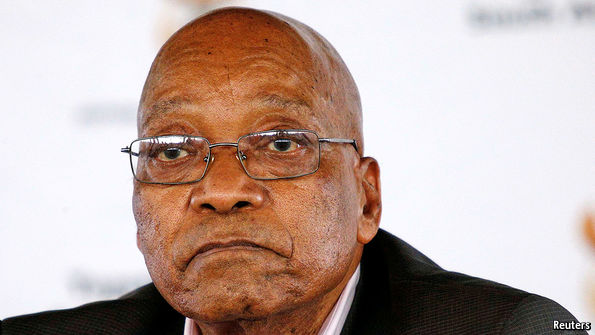The markets and the unions agree: it’s time for a new broom

“AMANDLA” (“power” in Zulu and Xhosa), comes the cry from the podium. “Ngawethu” (“to us”), the crowd roars back. The old chants that once rumbled from South Africa’s townships are again ringing out. But this time they are directed not at apartheid but against a reckless attempt by Jacob Zuma, a president who faces 783 charges of fraud and corruption, to tighten his grip on power and install a pliant successor.
The protests were sparked by a cabinet reshuffle last week. Mr Zuma fired Pravin Gordhan and Mcebisi Jonas, the finance minister and his deputy. Both are well-regarded by investors and economists. They are credited with putting a lid on public debt and resisting the biggest of the president’s boondoggles, a plan to spend as much as 1trn rand ($73bn) building nuclear power plants that South Africa does not need and cannot afford (see article). This is not the first time Mr Zuma has tried to mount a hostile takeover of the Treasury. Last time, in 2015, the markets forced him to backtrack. On this occasion he seems determined to see it through.
The new finance minister is a Zuma protégé. Malusi Gigaba plans “radical economic transformation” and to take back the Treasury from “orthodox economists [and] international investors”. In a country where, even by the narrowest definition, 27% of the workforce are jobless that might have struck a chord. Yet it has fooled hardly anyone. In a stunning move, the ruling party’s two main allies, the South African Communist Party and the Congress of South African Trade Unions, have called on Mr Zuma to resign. Both suspect him of wanting to loosen the controls that have kept the Treasury honest, even as corruption has flourished elsewhere in the government.
Without Mr Gordhan’s vigilance, they fear that it will be easier for bigwigs to hand contracts to chums. An anti-corruption ombudsman found that this is exactly what happened at the state-owned commuter-rail company when its chairman was one Sfiso Buthelezi—who is the new deputy finance minister. Mr Gigaba’s record hardly inspires confidence either. As the minister for state enterprises, he told the electricity monopoly to buy coal only from black-owned firms; a process so mismanaged that it contributed to power cuts which knocked 1-2 percentage points off the national growth rate.
Mandela weeps
Another shock is looming. Standard & Poor’s has downgraded the government’s credit rating to junk for the first time since 2000. If another big credit-rating agency follows suit, its bonds may be removed from the main international indices. Investors such as pension funds that track these or are barred from owning junk would be obliged to sell. Interest rates would soar (they are already higher than those of Russian debt). The rand would plummet still further. South Africa’s tentative economic recovery would stall, depressing growth from its forecast level of about 1% this year and 2% in 2018.
Mr Zuma is promoting loyalists to cement his grip on the ruling African National Congress (ANC), ahead of a party conference at the end of the year. Among other things, he wants it to pick a successor who will protect him from prosecution. His favoured candidate is his ex-wife, Nkosazana Dlamini-Zuma. The opposition Democratic Alliance (DA) would love to face her. They think another Zuma at the helm would cost the ANC millions of votes in national elections in 2019, accelerating its decline after the loss of three big cities last year.
So ANC MPs should take heed. They will soon have to vote in parliament on a motion of no confidence in Mr Zuma called by the opposition. They have rejected similar motions before, in the name of party unity, and could do so again. But they should ask themselves: is Mr Zuma really the best torchbearer for the party of liberation? By ignoring court orders, he undermines the constitutional democracy for which ANC members once fought and died. His patronage machine, by deterring investment, impoverishes all South Africans, bar the well-connected. He is not just leading the country into an economic ditch, but also his party to electoral defeat. The ANC should do the rainbow nation a favour and dump Mr Zuma.

